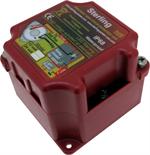Firstascent
Solar Enthusiast
- Joined
- Mar 7, 2020
- Messages
- 265
I’ve mostly decided (90% sure) I’m going to add a 24v alternator in my truck, it’s intended purpose will be solely to charge my battery bank in my fifth wheel.
I’ve been talking with a company that will custom make one for me, 24v 150A.
I already have my battery back which is 14.3kwh of lifepo4 2p8s 280ah cells. But besides my battery’s and my Batrium BMS, that’s all I have do far for my solar setup.
with that being said, is there anything specific I should ask the company or verify any specs I need to be aware of?
From an install standpoint, I think it’ll be fairly straight forward. There is a factory bracket option for a second alternator, and since it wouldn’t be charging the vehicle I don’t need to worry about tying into the truck electrical system, I’d just find a way to run them back to my fifth wheel.
I’ve been talking with a company that will custom make one for me, 24v 150A.
I already have my battery back which is 14.3kwh of lifepo4 2p8s 280ah cells. But besides my battery’s and my Batrium BMS, that’s all I have do far for my solar setup.
with that being said, is there anything specific I should ask the company or verify any specs I need to be aware of?
From an install standpoint, I think it’ll be fairly straight forward. There is a factory bracket option for a second alternator, and since it wouldn’t be charging the vehicle I don’t need to worry about tying into the truck electrical system, I’d just find a way to run them back to my fifth wheel.




